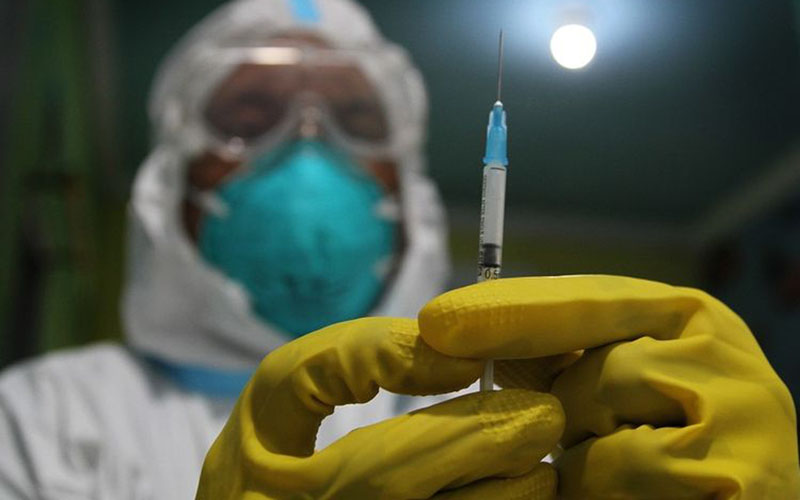NO
DISEASE
NOTE
1.
Autoimmune disease
Individuals with autoimmune diseases deserve to get vaccinated if the disease has been declared stable according to the recommendations of the treating doctor.
2.
Anaphylactic reaction (not due to COVID-19 vaccination)
If there is no evidence of an anaphylactic reaction to the COVID-19 vaccine or components contained in the previous COVID-19 vaccine, then the individual can be vaccinated against COVID-19. Vaccination is carried out under close observation and preparations for dealing with severe allergic reactions. Should be done in health services that have complete facilities.
3.
Medicine Allergy
It should be noted that patients who have a history of allergies to the antibiotics neomicin, polymyxin, streptomycin, and gentamicin should pay attention, especially to vaccines containing these components. However, the COVID-19 vaccine does not contain these components so that the COVID-19 vaccination can be given.
4.
Food allergies
Food allergies are not a contraindication to COVID-19 vaccination.
5.
Asthma
Asthma that is controlled can be given the COVID-19 vaccination
6.
Allergic rhinitis
Rhinitis is not a contraindication to vaccination against COVID-19.
7.
Urticaria
If there is no evidence of urticaria as a result of the COVID-19 vaccination, then the vaccine is appropriate. If there is evidence of urticaria, it is the doctor’s decision to clinically administer the COVID-19 vaccination. Antihistamines are recommended prior to vaccination.
8.
Atopic dermatitis
Atopic dermatitis is not a contraindication to vaccination against COVID-19.
9.
HIV
HIV patients in good clinical condition and taking ARV drugs regularly can be given the COVID-19 vaccine.
10.
Chronic Obstructive Pulmonary Disease (COPD)
Controlled COPD can be given the COVID-19 vaccination.
11.
Interstitial Lung Disease (ILD)
ILD patients deserve the COVID-19 vaccination if they are in good condition and not in an acute condition.
12.
Liver disease
- – Vaccination loses its effectiveness as liver disease progresses. Therefore, an assessment of the need for vaccination in patients with chronic liver disease should be assessed early on, when vaccination is most effective / vaccination response is optimal.
- – If possible, vaccinate before liver transplant.
- – Inactivated vaccine (like Coronavac) preferably in patients with cirrhosis of the liver
13.
Liver transplant
Individuals who have had a liver transplant can be given the COVID-19 vaccination for at least 3 months after the transplant and have used minimal doses of immunosuppressant drugs.
14.
Hypertension
As long as the blood pressure is <180/110 mmHg and or there is no acute condition such as a hypertensive crisis.
15.
Chronic Kidney Disease (PGK) non dialysis
Non-dialysis chronic kidney disease and dialysis in a clinically stable condition deserve the COVID-19 vaccine because of the high risk of infection and the very high risk of mortality and morbidity in this population if infected with COVID-19.
Stable criteria include patients who are not experiencing acute complications related to chronic kidney disease, or not in other clinical conditions where the treating doctor is not eligible for vaccination.
16.
Chronic Kidney Disease (PGK) dialysis (hemodialysis and peritoneal dialysis)
17.
Kidney transplant
Kidney transplant recipient patients receiving immunosuppressant doses maintenance and in a clinically stable condition it is appropriate to receive the COVID-19 vaccine given the high risk of infection and the very high risk of mortality and morbidity in this population if infected with COVID-19.
Note:
Kidney transplant recipient patients who were in rejection condition or were still taking induction dose immunosuppressants were assessed not yet feasible to undergo the COVID-19 vaccination.
18.
Heart failure
Heart failure that is in a stable condition and is not acute can be vaccinated
19.
Coronary heart disease
Coronary heart disease that is in a stable condition and is not being acute can be vaccinated
20.
Arrhythmia
Arrhythmias that are stable and not in acute / malignant conditions can be vaccinated
21.
Gastrointestinal
- – Gastrointestinal diseases other than Inflammatory Bowel Disease Acute (IBD) deserves the COVID-19 vaccination.
- – In acute IBD conditions such as bloody bowel movements, weight loss, fever, decreased appetite, vaccinations should be postponed.
- – Data collection and screening of patients with autoimmune diseases in the gastrointestinal sector, such as IBD (Ulcerative Colitis and Crohn’s Disease) in the screening there were questions related to gastrointestinal symptoms such as chronic diarrhea (changes in BAB patterns), BAB blood, significant unwanted weight loss.
22.
Diabetes Mellitus Type 2
Except in acute metabolic conditions.
23.
Obesity
Obese patients without severe comorbidities.
24.
Hyperthyroidism and Hypothyroidism (either autoimmune or non-autoimmune)
In treatment, if it is clinically stable, the COVID-19 vaccine may be given.
25.
Thyroid nodules
It is permissible to give the COVID-19 vaccine if there are no clinical complaints.
26.
Blood cancer, solid tumor cancer, blood disorders such as thalassemia, immunohematology, hemophilia, coagulation disorders and other conditions
The eligibility of individuals with this condition is determined by an expert doctor in the related field, consult before giving the COVID-19 vaccine.
27.
Blood donation (Complete blood / Whole blood)
Sinovac vaccine recipients can donate blood after 3 days after vaccination if there are no side effects of vaccination.
28.
Psychosomatic disorders
- – It is highly recommended that communication, provision of information and education be sufficiently straightforward to vaccine recipients.
- – Identification of patients with psychosomatic disorders, especially anxiety disorders and depression, requires adequate education and medical management.
- – People who are experiencing severe stress (anxiety / depression), it is recommended to improve their clinical condition before receiving vaccination.
- – Special attention to occurrence Immunization Stress-Related Response (ISRR) which can occur before, during and after immunization in people at risk:
- 1. Age 10-19 years
- 2. History of vaso-vagal syncope
- 3. Previous negative experiences with injection administration.
- 4. There is prior anxiety.
– .


